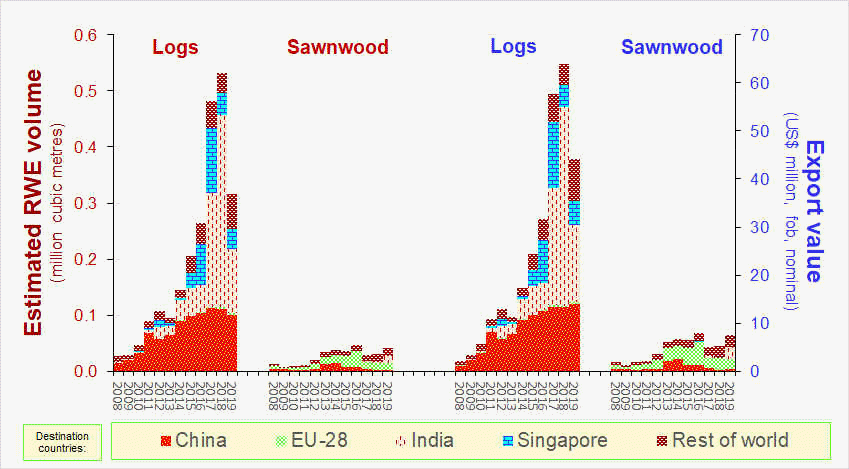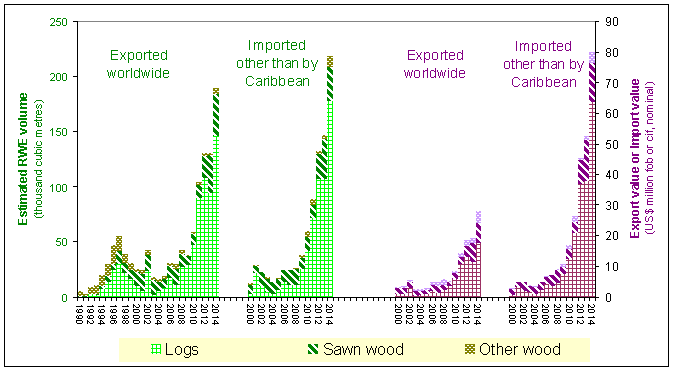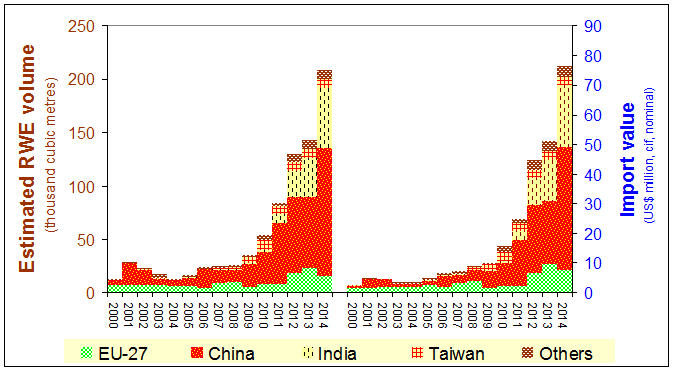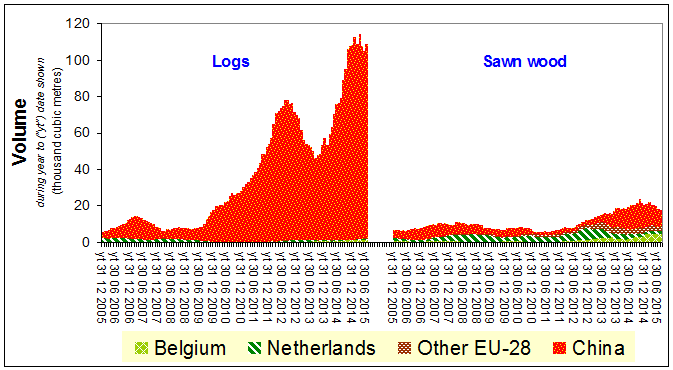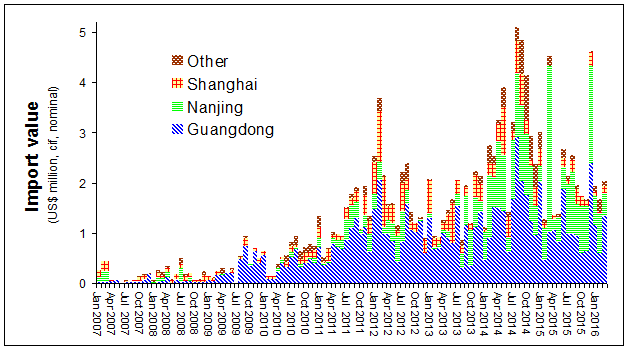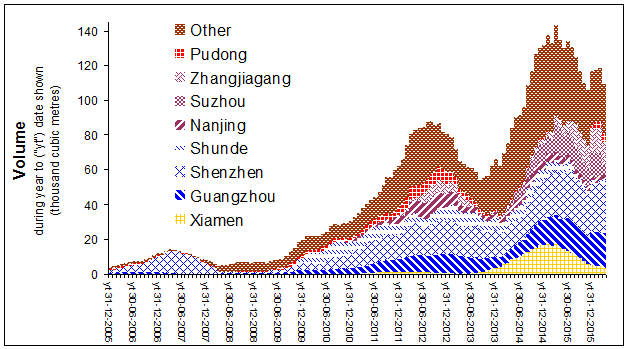|
|
||||||||||||||||||||||||||||||||||||||||||||||||||||||||||||||||||||||||||||||||
|
|
||||||||||||||||||||||||||||||||||||||||||||||||||||||||||||||||||||||||||||||||
|
Suriname
|
||||||||||||||||||||||||||||||||||||||||||||||||||||||||||||||||||||||||||||||||
|
Source: SBB,
China Customs, Eurostat, UN Comtrade, USITC Trade DataWeb, others
-
Source: as an alternative to the export statistics published by SBB, the above is based on the import statistics of importing countries (other than Caribbean Islands or Central America [Footnote 2]
Source: based on General Administration of Customs of the People's Republic of China and Eurostat China's
import of logs from Suriname (import value, by customs district) China's
import of logs from Suriname (volume, by "location of importer") |
||||||||||||||||||||||||||||||||||||||||||||||||||||||||||||||||||||||||||||||||
|
Ten or so years ago, the real and prospective impact of Asian (ultimately chinese) exploitation - primarily through Berjaya, MUSA, Suri-Atlantic - was so negative that the government of Suriname was placed under such pressure by the international community to ensure the withdrawal of those logging enterprises from Suriname. They were replaced temporarily by others, for example Fine Style and Ji Shen[¶1, p3][pp168 & 169]. There is now substantial renewed Chinese interest in exploiting the weakly managed forest of Suriname. More than half the area is said to be allocated as concessions to those interests with much of the remainder being allocated to those connected to the party in power.[-] It is likely that few of these concessionaires are in compliance with the law - before a felling licence can be granted, an inventory and a management plan must have been prepared and the concessionaire must demonstrate the financial and technical capacity to properly implement the management plan.[121] Given this substantial foreign interest and (presumably related to it) that Suriname can not manage its forest sufficiently with the revenue it receives [¶1, p25] from logging and related exports, it is remarkable that Suriname has not increased the fees it charges for such activities. China accounts for a large majority of Suriname's exports of logs, followed by India and Taiwan. The EU accounts for most of Suriname's exports of sawn wood. The ten-fold increase in exports since 2008 might reflect poor governance. The most prominent foreign interest is that of Greenheart, which was acquired by Sino-Forest prior to the latter's demise (including for alleged fraud). Greenheart, listed on the Hong Kong stock exchange but registered in a British Overseas Territory (- Bermuda), is owned by Sino-Capital Global (a subsidiary of Sino-Forest) and in turn by Emerald Plantation (a vehicle for Sino-Forest assets). A number of Greenheart's directors were directors of Sino-Forest and a number are directors of Emerald Plantation. Timber companies the size of Greenheart would not normally attract directors who have had such prestigious careers. Soon before its demise, Sino-Forest made a loan of US$40 million to Mega Harvest International (a subsidiary of Greenheart) which was not secured with Greenheart assets. Greenheart's external auditors noted that the company not only made a substantial loss during 2012 but its current liabilities exceeded its current assets (by a substantial margin, due to that US$40 million loan). During December 2012, Suriname withdrew a 180,000ha forest concession from a licence holder (Tacoba) which had subcontracted logging rights to Forest Technologies a subsidiary Vista Marine Services (a subsidiary of Greenheart). This reduced the area for which Greenheart held subcontracted logging rights in Suriname to 92,000 ha - which is presumably the FSC-certified concession of Suma Lumber. Greenheart has access to this concession for two years[slide 19], until December 2013, and was managing it when the concession's FSC-certificate was renewed (during 2013) [4.3.3] (- the certificate will presumably not be valid once Greenheart's rights expire). However, Greenheart might have also been subcontracted logging rights to other concessions, through its subsidiaries, Octagon [(a) p9] and Beach Paradise[(b) p9]. At least one member of Suriname's parliament considers that concession holders should be penalised for subcontracting their logging rights without government approval.[-] Indeed, it seems[Berjaya, subsection Suriname] that the subcontracting of logging rights is illegal, (as it is in Guyana unless explicitly permitted by the President). If so, products made at least partly from wood derioving from those concessions should not be placed on the market in the EU and USA under the EC's Regulation 995/2010 and the USA's amended Lacey Act.. A number of other subsidiaries of Greenheart appear to directly hold concessions: Dynasty Forestry (a subsidiary of Beach Paradise), Epro and Octagon. Epro's concession is due to expire in 2015[p82]. The area which Greenheart holds directly is 230,000ha.[slide 14] Greenheart's subsidiaries in Suriname have included[p85] Prime Forest (formerly Superb Resources, which still has a concession[704a]). Annual and semi-annual reports by Stichting voor Bosbeheer en Bostoezicht ("SBB") indicate that little if any sawn wood has been produced by Greenheart's Apoera saw mill during the nine months since August 2012[slide 7] (when that mill was officially opened). As indicated in the chart above, import statistics for EU Member States' - the primary target market for that sawn wood[¶3, p10] - suggest that, the volume of sawn wood imported into the EU from Suriname has increased steadily since the end of 2011 but remains small. Prior to being acquired (by Omnicorp), Greenheart's then logging concessions were valued [Appendix IV] by someone who subsequently became a director of Greenheart. That valuation was based largely on information provided by Greenheart's then owners and included a number of caveats. A number of other senior executives of Greenheart were previously employed by a company which valued Sino-Forest's timberland assets in China. There is a risk that Suriname will derive little benefit from the export of timber logged in forest near the Corentyne river - some such timber is allegedly "exported" duty free ostensibly to Guyana but actually for direct export to China by a timber company (which has had discussions with Greenheart) operating in that part of Guyana. Export duties payable in Suriname are substantially greater than they are in Guyana. Sino-Forest acquired 13% of Greenheart during the third quarter of 2007. Greenheart has an agreement to sell Sino-Forest 34,285 m3 of selected log species for US$6 million (double the declared f.o.b. value) - indicating that these enterprises' trade declarations might warrant scrutiny for transfer pricing fraud. Greenheart plans to selectively log between 200,000m3 and 250,000m3 annually (at rates which would probably exceed the sustainable level of extraction for some if not most of the species logged, made the company's sustainable forest management credentials - and particularly its purported aim of achieving FSC certification of its holdings in Suriname by 2010 - dubious). Such a large volume could have a major adverse impact on the local timber industry and would increase the recent level of Suriname's timber exports by a factor ten on a roundwood equivalent volume basis. Greenheart suggests that it will establish two saw mills each with annual output capacity of between 40,000m3 and 50,000m3 (implying a rather poor conversion efficiency). If Greenheart wishes to export timber to North America, Europe and Japan, those markets are likely to demand credible evidence of the legality of that timber - particularly in relation to the company's purported logging rights - and of the sustainability of its management of those concessions. Given that Greenheart's corporate structure seems designed to minimise the payment of taxes, Omnicorp's endorsement of the company's Socially Responsible Corporate policy might seem rather hollow. Greenheart stresses its close relationship with the government of Suriname and local political leaders.[-] Greenheart's 126,825ha concession seems to be in the same locality as a controversial concession (which may have been withdrawn) of the same size attributed to (or at least claimed by) another offshore company - Tacoba - during 1996. A court case disputing the validity of that[69] and other concessions has yet to be resolved. The Tacoba concession appears to have been cancelled by the government. Given the very short time period for which Greenheart asserts that it has concessions and/or logging rights [p105] in Suriname, it is remarkable that FSC-certificates[slide 19] have been issued to Greenheart for forest management of at least some of those concessions. Although the company may have exported timber to certain EU Member States[p10], it is unclear whether Greenheart will continue to do so under EC Regulation 995/2010 (which gives whoever places wood-based products on the EU market an obligation to ensure that those products have a non-negligble risk of being illegal). The company's apparent desire to trade in timber from Africa, Brazil, Malaysia (if Sarawak), Papua New Guinea, Peru, and Russia,[p10] might be construed as inconsistent with its commitment to legality and sustainability. The company's corporate structure, including its subsidiaries, might inhibit its products' acceptability within the EU, particularly given its links to Sino-Forest. It appears that Greenhear and/or Sino-Forest (whose share price has collapsed subsequent to allegations of fraud) acquired management rights to at least one forest concession without doing so through the proper channels - Tacoba, a wholly-owned subsidiary of China International Marine Containers ("CIMC"), was acquired indirectly through offshore companies during 1997 - when CIMC likewise procured two other entities (Lumprex and Topco) each of which is said to have had logging rights to 150,000ha of forest in Suriname (Lumprex still has a large concession[726]. CIMC claims to have procured 450,000ha of rights in Suriname during 1998 (when it also procured more than 300,000ha in Cambodia through Gold Terrain Assets). Remarkably, CIMC claims that Tacoba had not commenced logging by the end of June 2007, ten years after it had acquired Tacoba. However, Jin Lin from Sarawak (or Ji Shen) is understood to have been logging, with active support from the military, in and around Tacoba's concession at the turn of the last decade. Further, CIMC's annual reports refer to sales from logging and of timber. A CIMC subsidiary, Xinhui, is one of the world's largest manufacturers of flooring for containers - which, depending on the suitability of Suriname's tree species, might help explain CIMC's interest in Suriname. Any link between one of Greenheart's (and Sino-Forest's former) directors and CIMC (via Cheung Kong) is likely to be coincidental.[final main paragraph] It would be remarkable if enterprises which have opaque, often offshore, ownership structures (presumably designed to minimise tax liabilties and implicitly deny benefits to the producer country) and/or whose businesses are unrelated to logging (or indeed sustainable forest management) would be eligible to legitimately own logging rights - particularly in the tropics. Further, it may be that a recent policy requiring Chinese companies abroad to "highlight sustainability, biodiversity and the development of local communities" when engaging in the forestry sector might constrain the business plans of Greenheart and its current and future owners. Zhong Heng Tai Investment Company (from Hong Kong) has sought to clear 40,000 hectares of forest (in Marowijne near Patamacca) ostensibly to expand the palm oil industry in Suriname by 700,000 tonne/year. Its plans, which include the importation of 1,000 Chinese people, are bitterly opposed locally. It is not clear whether that area would be suitable for a palm oil plantation or whether that (otherwise little known) company actually intends to withdraw or declare itself bankrupt once it has profited from the (tax free) sale of logs felled during the clearance of that forest. The cash flow profile of the project would be U-shaped, investment being required after profitable forest clearance and before net profits were earned from palm oil sales. The ability of a"developer" to borrow using its prospective plantation project as collateral would of course substantially reduce once the forest has been cleared. Other enterprises having an interest in the logging of the forest of Suriname's peoples include All Woods Timber (which has links with logging in Indonesia, Malaysia and Papua New Guinea). China's imports
of logs from Suriname
|
||||||||||||||||||||||||||||||||||||||||||||||||||||||||||||||||||||||||||||||||
|
Copyright
globaltimber.org.uk
|
||||||||||||||||||||||||||||||||||||||||||||||||||||||||||||||||||||||||||||||||

